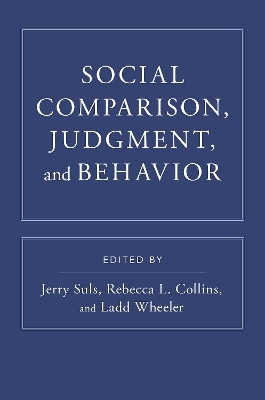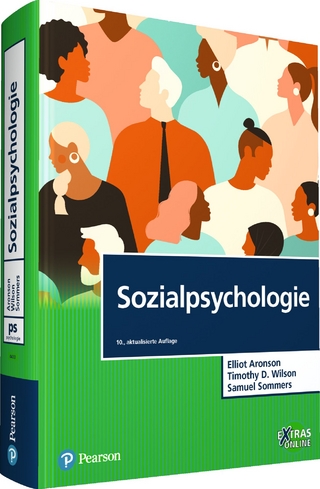
Social Comparison, Judgment, and Behavior
Oxford University Press Inc (Verlag)
978-0-19-062911-3 (ISBN)
Comparison with other people, a core element of social life, influences self-concept, attitudes, conformity, psychological and physical well-being, achievement, educational outcomes, and social movements. Social comparison has become particularly salient as social and income inequalities have been increasingly recognized in the United States and elsewhere globally.
This volume presents classic and state-of-the-science chapters by leading experts that survey the major areas of social comparison theory and research. Authored by noted experts, the volume is divided into three sections: Basic Comparison Processes, Neighboring Fields, and Applications. The first section is comprised of chapters that update classic theories and present contemporary advances, such as the dominating effect of local versus global comparisons, an analysis of the psychology of competition, how comparisons across different domains influence self-concept and achievement, and the integral connections between stereotyping and comparison. The second section introduces perspectives from related fields, such as the decision and network sciences, that shed new light on social comparison. The third section focuses on practical applications of comparison, including relative deprivation, health psychology, the effects of income inequality on well-being, and the relationship of power to comparison. This volume is a must-read for anyone interested in the field of social comparison and its implications for everyday life.
Jerry Suls received his Ph.D. in Psychology from Temple University in 1973, and subsequently held faculty positions at Georgetown University, the State University of New York at Albany, and the University of Iowa. Formerly the Editor of Personality and Social Psychology Bulletin (1998-2001) and Social and Personality Psychology Compass (2006-13), he has served on numerous editorial boards and panels. His research has appeared in more than 230 publications and been supported by the National Institutes of Health, American Heart Association, National Science Foundation, and The Robert Wood Johnson Foundation. In 2012, he received the Distinguished Scientific Contributions Award from APA Division 38 (Society for Health Psychology). Currently, he is Senior Scientist in the Office of the Associate Director of the Behavioral Research Program at the National Cancer Institute. Rebecca L. Collins received her Ph.D. from the University of California, Los Angeles in 1989. She is Senior Behavioral Scientist at the RAND Corporation in Santa Monica, CA. For the past two decades, she has examined how comparison and related processes influence substance use and sexual risk behavior among adolescents, young adults, sexual minorities, and individuals living with HIV infection. Currently, she is studying the effectiveness of social marketing campaigns designed to increase treatment seeking for mental health problems. Her research has appeared on the Today Show, CNN, and NBC Nightly News and has been featured in Time Magazine, The New York Times, the Washington Post, and USA Today. Ladd Wheeler received his Ph.D. in Social Psychology from the University of Minnesota in 1962. His major research interests included social comparison theory, behavioral contagion, attractiveness, and social interaction. He pioneered the use of the rank-order paradigm and diary methods in social comparison research, such as the Rochester Interaction Record and the Social Comparison record. He was president of the Society for Personality and Social Psychology and the founding editor of the Review of Personality and Social Psychology. He passed away in 2018.
Section I Basic Processes
Chapter 1. A History of Social Comparison
Ladd Wheeler and Jerry Suls
Chapter 2. How Social Comparison Affects the Self: The Selective Accessibility Mechanism
Thomas Mussweiler
Chapter 3. Looking Up and Ahead: The Social Comparison of Abilities, Personal Attributes and Opinions
Jerry Suls and Ladd Wheeler
Chapter 4. Individual Differences in Social Comparison: The Complex Effects of Social Comparison Orientation
A.P. Buunk, F.X. Gibbons, Pieternel Dijkstra, and Zlatan Krizan
Chapter 5. Social Comparison Before, During, and After the Competition
Stephen M. Garcia, Zachary A. Reese, and Avishalom Tor
Chapter 6. Effects of local and global comparisons on self-assessment
Ethan Zell and Mark Alicke
Chapter 7. Agency and Communion in Social Comparison
Kenneth D. Locke
Chapter 8. Dimensional Comparison Theory: Extending the Internal/External Frame of Reference Model
Friederike Helm, Herbert W. Marsh, Theresa Dicke, and Jens Möller
Chapter 9. Envy and Social Comparison Envy
Niels van de Ven and Marcel Zeelenberg
Chapter 10. Stereotypes and Relative Social Status in Social Comparisons
Jillian K. Swencionis and Susan T. Fiske
Chapter 11. Perils of Outperforming Others
Anne Zell, Julie Exline, and Marci Lobel
Chapter 12. Temporal Comparisons in a Social World
Anne E. Wilson and Erin Shanahan
Section II Neighboring Fields
Chapter 13. Local comparisons and general standards: Implications for
Superiority and Inferiority Biases
Yechiel Klar
Chapter 14. Comparing One and Many: Insights from Judgment and Decision Making for Social Comparison
Eleanor Putnam-Farr and Carey K. Morewedge
Chapter 15. Approaches to Comparison and Their Influence on Social Comparison
Arthur Markman
Chapter 16. How Social Networks Can Inform Social Comparison
Jingwen Zhang and Damon Centola
Chapter 17. The Evolutionary Roots of Social Comparisons
Marcela E. Benítez and Sarah F. Brosnan
Section III Applications
Section 18. Relative Deprivation Theory: Advances and Applications
Heather J. Smith, Thomas F. Pettigrew, and Yuen J. Huo
Chapter 19. Health Cognitions, Decision Making, and Behavior: The Ubiquity of Social Comparison
William M.P. Klein and Elise Rice
Chapter 20. Social Dominance Theory and Comparison
Robin Bergh, Gregory Davis, Sa-Kiera Hudson, and Jim Sidanius
Chapter 21. Myopia of the Masses: Relative Deprivation, Comparative Scope, and System Justification
Ruthie Pliskin, Daniel Yudkin, John T. Jost, and Yaacov Trope
Chapter 22. Income Inequality and Well-being: The Role of Social Comparison
Felix Cheung and Richard E. Lucas
| Erscheinungsdatum | 30.12.2019 |
|---|---|
| Verlagsort | New York |
| Sprache | englisch |
| Maße | 236 x 160 mm |
| Gewicht | 1066 g |
| Themenwelt | Geisteswissenschaften ► Psychologie ► Sozialpsychologie |
| ISBN-10 | 0-19-062911-8 / 0190629118 |
| ISBN-13 | 978-0-19-062911-3 / 9780190629113 |
| Zustand | Neuware |
| Haben Sie eine Frage zum Produkt? |
aus dem Bereich


